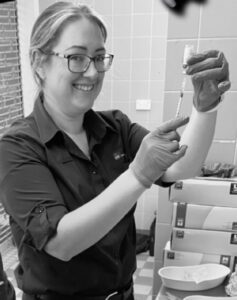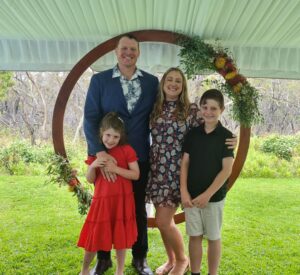By Amy Galliford
In many ways, Holly Miller’s work is just like any other nurse’s. One by one, patients file into her clinic room in a health centre for a community of women in NSW. She greets them with a smile, she tends to their needs and she sends them off in a better state than when they entered.
The difference is that when these women leave, they are returning to prison cells; this community is a women’s correctional centre. Holly is the Sexual and Women’s Health Nurse in the prison’s Health Centre, a role she has held for the past 5 years. With many of these women arriving in prison from highly traumatic circumstances, Holly’s first task is building trust.
“There’s a real art and skill in being deliberate in creating an environment for vulnerability to happen and doing it quickly,” she says.
However, with a background working in emergency departments, sexual health clinics, women’s health centres, and plenty of experience providing health care in parlours (the correct term for brothels) as part of the Sex Workers Outreach Program, Holly is no stranger to the art of building trust.

“It’s just the basics – the way you talk with them, make eye contact, stay friendly and approachable, you know, moving away from that clinical model.
I just think of Jesus and how He walked with sex workers and lepers; He loved them for who they were, and He met them where they were at. I try and make people feel I am meeting them where they are at.
“Sometimes it takes three or four visits for women to realise I genuinely care about them and their health. It takes time. It requires a lot of patience and kindness and understanding.
It’s not about me or me needing to get what I need achieved; it needs to be about the other person. It’s about removing your own ego and focusing on slowly pulling the threads of that person to better understand who they are and what they need.”
Where the world is quick to define these women by their imprisonment, hearing the full arc of their stories offers Holly a deeper insight into the realities of their lives.
Most of the women come from low socioeconomic backgrounds, marginalized communities, and a complex history of childhood trauma and abuse. A common pattern involves women turning to drugs and addiction to cope with their trauma, with this addiction in turn leading to crime.
“From hearing women’s stories, I realized that the stereotype of people in prison being bad people was nothing like what I was seeing. The majority of people I meet in prison are just women who have had really traumatic lives.”
From where she is standing, compassion is the only reasonable response to stories such as these.
“When I hear these stories, I just think to myself: one, I am so blessed to have had the life I’ve had; and two, if I was faced with that kind of adversity with no support, I can see how easy it would have been to turn to all of this.
“So many people don’t understand how deeply trauma and abuse impacts the soul of a human being. They can’t just ‘get over it’. If people don’t have a support network or a healthy living environment or financial means, it’s so hard to get yourself out of that place.”
Holly’s own upbringing enables a deeper compassion in her for these women’s situations. Having faced difficulties in her home environment in childhood and struggling mentally as a teenager as a result, she has a unique ability to empathise with the challenges her patients are facing.
“I feel that God has used the circumstances I used to question him about. I now see that God has been able to use my experiences to help me to understand the people I encounter. My adversity has allowed me to minister to other people’s adversity. This too was not wasted; God worked it together for good.”
Holly remains mindful of what memories are opened up by these conversations with the women, knowing that they are often returning to a cell on their own.
However, the response she receives time and time again from the women is, “Thank you for listening, I’ve never shared all of that.”
Alluding to the frequent negative experiences these women have with authorities, Holly says, “What they need from me is non-judgement. They need time to talk, and they need to not be discredited or questioned for what they are saying. They need me to believe them.”
Holly jokes that she regularly gets comments from prison guards and other nurses saying, “People always come out of your room crying.”
Carrying the Calling
It’s no small cross to carry. Sustaining the weight of her work has required Holly to depend heavily on God, especially when things have become heavy.
Vicarious trauma was a challenge that came with the early stages of the job. Holly remembers lying awake with the brutal details of women’s stories circling around her head, with no real tools to help her process them. She did a short course in managing this kind of trauma but credits her faith as the ultimate force that got her through this.
“Especially recently, God has given me so much healing in my mind and has helped me to process. He has taught me to see myself as a blessing in this space – I’m there to hear people’s stories while understanding that they are not mine to hold.”
There are times Holly has doubted her calling to work in the prison. A couple of years ago, when a series of challenges had added weight to the burdens of the work, she began to question whether this was really for her. Twice, she sat at her desk and asked God for direction, and both times the consults that followed were encounters of profound significance with women that desperately needed her compassion.
“These were times where the women were hurting and needing to share and to have that space of support and understanding. They needed someone to hear them. I could feel God in me saying, ‘Holly, this is where I have placed you. This is where I want you to be. This is your ministry.’”
While it can feel heavy, most of the time Holly’s work feels more like a blessing than a burden.
“I feel really blessed to have something that feels so fulfilling. Not everyone gets to have the satisfaction in their work of helping people and journeying with people. I feel so blessed by hearing people sharing – it adds to my life too! Sometimes people say, ‘Thank you for listening,’ and I feel like saying, ‘No, thank you!’ The work gives back to me.”
As she has been faithful in her work, she has been changed by it for the better.
 “Because of this work, I have more courage, more mercy, more patience. It has really allowed me to grow more of that biblical patience and to understand that things take time. It’s not about fixing people or fixing their lives; it’s about sitting with them through their chaos and knowing that it may not change.”
“Because of this work, I have more courage, more mercy, more patience. It has really allowed me to grow more of that biblical patience and to understand that things take time. It’s not about fixing people or fixing their lives; it’s about sitting with them through their chaos and knowing that it may not change.”
As she is transformed by the Holy Spirit in the work that she does, her eyes remain fixed on the image of Jesus – the ultimate healer.
“My drive and the pull in my heart is to become more Christlike.”
Read more stories from churches of Christ in NSW & ACT HERE